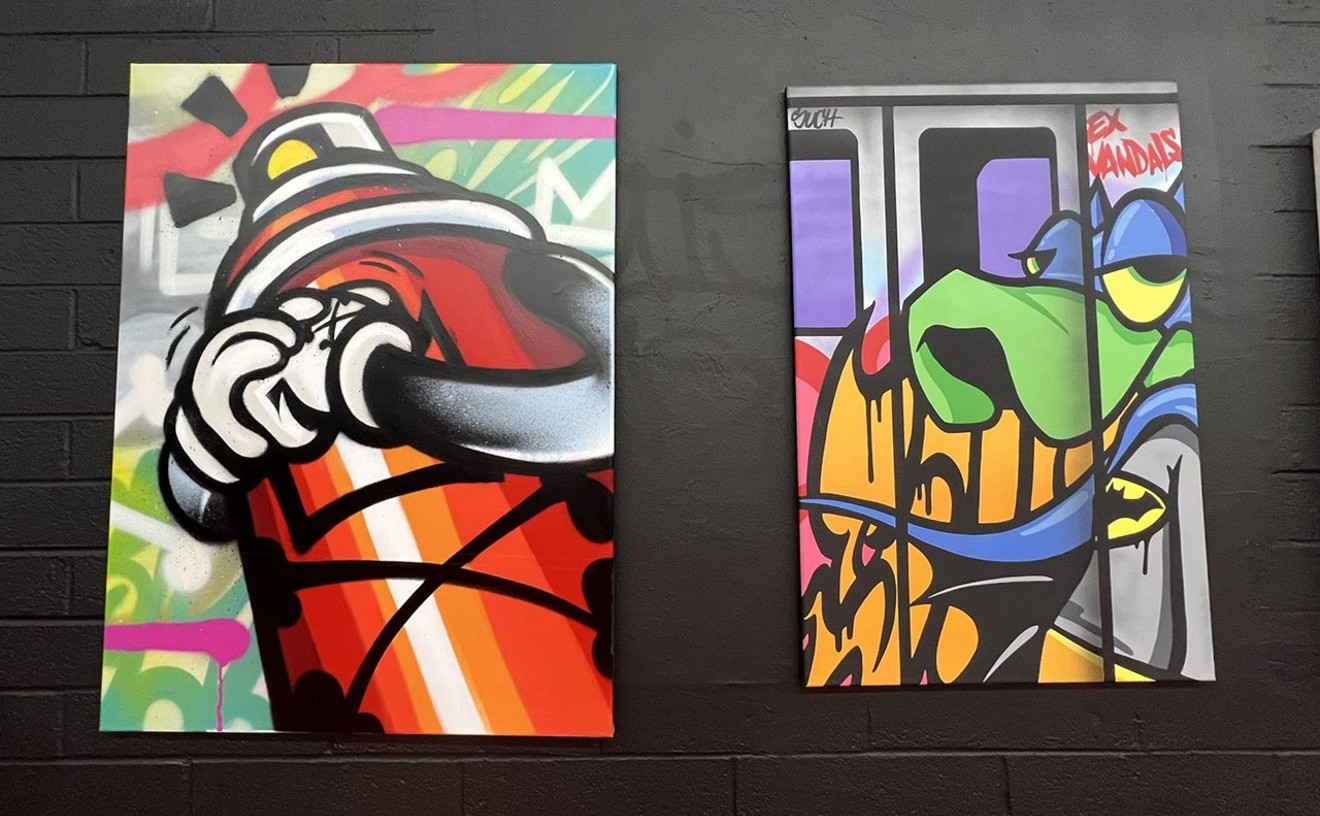In the world of academia, where many things are taken quite seriously, Gus Edwards is like a breath of fresh air. He talks about how as a kid in the Caribbean he was inspired to acting by Sidney Poitier. Was it the chance to... prove that blacks were as capable as whites in the acting profession? To bring the transformative power of theatre to the masses?
Hell no.
Poitier made a lot of money and got laid a lot," Gus says. This is typical Gus Edwards, although he often makes these remarks so quickly you're not sure you really heard them. Could he really have told his Introduction to Theatre class that a theatrical performance without an audience is like sex without a climax? Could he really have said, I'm as shallow as everyone else"? You listen to him for a while, and you are forced to conclude Gus is that rarity in life, a man in full possession of mental health.
And it's hard to avoid listening to him. Gus Edwards is a talker. During class, he holds forth for 50 minutes without a single um," providing a steady stream of solid information punctuated by hilarious asides. One of his former students says that when he goes out to lunch with Gus, all he has to do is eat, nod and listen. Gus does the rest.
Now Gus Edwards is talking in his office at Arizona State University, where he is director of the Multi-Ethnic Theatre program. He is talking about how he has given up playwriting. This is indeed a revelation. Gus Edwards, after all, made his reputation as a playwright with the Negro Ensemble Company in New York, and became one of the black playwrights reporters called when they wanted a quote on black theatrical subjects.
He spent two years as playwright-in-residence at ASU, and one of his plays, Tropicana, is being performed there this week in connection with the Martin Luther King Jr. celebration.
To hear Gus-it's impossible to call a man named Gus Mr. Edwards"-tell it, that's all in the past. He now considers himself a teacher, a natural teacher, and wishes he had discovered it earlier.
As it was, he was forced to spend time as a successful playwright until discovering his true vocation in his mid-40s.
Gus today is 52. With his round face and short-cropped hair, he still looks like a kid. He looks completely different in photographs from a decade agoÏbig mustache, mini-Afro-but that may be the actor's uncanny ability to change his appearance seemingly at will.
Gus arrived in New York from the Caribbean in 1959 and scratched out a few parts onstage and in movies. In those days, though, before Miami Vice made Jamaican accents a sine qua non for a black actor, the lilt of his native Antigua was a liability. Typically, he wasn't too proud to be a bartender or a stevedoreÏhe tended bar, in fact, until 1984, when he became ASU playwright-in-residence. Gus talks about being a bartender with great pride, not only, as he says, because he made a lot more money and had a better social life. I've been working class all my life," he'll tell you.
You know the most important thing about being a bartender?" Gus says. It's thinking three drinks ahead." He snaps his fingers indicating a bartender reaching for Seagram's as he put back the Cutty Sark and checks the guy down the bar just finishing his first martini. Bartenders who didn't put their bottles back in the proper place drove him crazy.
Gus has the same practical, down-to-earth attitude toward theatre. One day in Introduction to Theatre, a big lecture course that meets three times a week, Gus starts talking about Gower Champion, the director and choreographer. As a teacher, Gus can sling definitions (opera is a dramatic musical entertainment in which all text is sung") and discuss Aristotle, but the times the kids put down their pens and lean forward to listen are the times he's talking from his own experience.
As Lin Wright, head of the theatre department and one of Gus' biggest fans, has explained, practical experience is what got Gus to ASU. Ten years ago, a guy with just a high school degree from someplace in the Caribbean probably couldn't have gotten a job at a university. Today, a life in the theatre makes up for the degree. Wright, a diminutive woman with red hair who runs a fairly loose ship at the theatre department office, recognizes Gus as that rare teacher who will give exams requiring essays to a lecture class of 300, the only teacher she knows of to inspire a student to write a letter of praise to the president of the university. Having a man with his connections was useful to ASU, too. Soon after Gus arrived to head the Multi-Ethnic Theatre program in 1988, he arranged for the world premiere of Jonquil to inaugurate the new Galvin Playhouse where Tropicana is being staged. Jonquil is by Charles Fuller, a very hot playwright who wrote A Soldier's Play. Gus knew him from New York, like he knows Gower Champion, the subject of the anecdote he's relating to the class.
Gower Champion was called in to take over a show because the director who'd been hired originally was making a mess of it-a situation usually referred to in the press as creative differences." And does Gus talk about the great metaphysical interpretation Champion imposed upon the show? No. He talks about how Champion got the place organized, so the chorus didn't sit around while the principals were running through their scenes, so the unions didn't get angry and so the production didn't hemorrhage the backers' money.
The first thing he did was to hand out schedules," Gus tells the kids. It's a business. Time is money."
This is why people refer to Gus as refreshing." Another term you'll hear is blunt." It usually comes from one of Gus' students in Introduction to Theatre, and refers to certain rules Gus has laid down. Eating, drinking or sleeping are forbidden. So is arriving late-trust a former actor to think of that-or leaving early. Gus says he once followed a student out of class, informed him in the hallway he was not interested in why he had left early and told him he couldn't come back.
That's not even mentioning the lectures, during which he will tell the kids the audience is the most important aspect of any theatrical experience. Or that his favorite type of theatre is the musical. Or that theatre is for storytelling and entertainment. If you want to be inspired, go to church.
If you weren't prepared, your mind could reel.
There are a couple of reasons Gus may give fuzzy-headed notions like creativity such short shrift. These reasons have to do with hard work, and with sheer luck, and with the things you learn by experience. And they may explain why one of Gus' colleagues, playwright-in-residence Jim Leonard, makes an exception for Gus when he describes most writers as not a very nice bunch of people...obsessive and alcoholic, and they talk about themselves and their work to the exclusion of everyone else." Such a description hints at why Gus prefers the pose of working-class hero to creative, elitist snob.
Gus says he spent 13 years writing his first play, The Offering, produced at the Negro Ensemble Company in 1977. He started it after he realized he wasn't going to have a career as an actor.
The play, about an aging hit man whose young protege stops by to pay him homage, is beautifully written, with an ear for dialogue rare in a writer from another culture. As with others of Gus Edwards' plays, the characters leap to life, even off the printed page. It is possible to imagine them outside the plot, doing completely different things. The play runs to 27 pages of text. At one point, Gus says, he had more than 500 pages. He kept cutting and cutting and rewriting and rewriting, until the play seems perfectly controlled, with not a word too many.
The Offering would never have been produced except for a chance conversation. Gus was working as a waiter, and one of his regular customers was a white minister who worked in Harlem. The minister forgot his wallet one day and Gus trusted him for the money. The minister, intrigued, asked Gus what he really was. Gus told him he was a playwright, for by this time he'd written two other plays. ²The minister turned out to be a friend of Douglas Turner Ward, head of the Negro Ensemble Company. The minister passed on a copy of The Offering to Ward, who liked it, and not only produced it, but took the starring role himself, became Gus' mentor and has been in town for the past three weeks, directing Tropicana.
The accidents of life," Gus calls that sequence of events, adding, We're all victims of a whimsical fate."
Despite his critical success-reviews that were adulatory almost to the point of overkill from the New Yorker's Edith Oliver-his is not exactly a household name. And despite large and important- looking entries in reference texts like Contemporary Literary Criticism and Contemporary Authors, he never escaped the circumscribed world of black theatre to reach a wider audience.
The public hardly knows who I am," he says. I made more money writing one TV show, Go Tell It on the Mountain, than I made in all the royalties of all the plays I'd written until then."
Even as a black playwright, Gus was always a little out of step. As Jim Leonard, Gus' successor as playwright-in-residence at ASU points out, Amiri Baraka-then LeRoi Jones-wrote confrontational black-vs.-white dramas like Dutchman, but Gus was doing something more subtle. In his second play, Black Body Blues, the black hero is victimized by his own brother, and is granted the greatest respect not in his own community, but in the home of the white man for whom he works as a butler.
Gus Edwards will discuss the message of his plays by making the extraordinary statement, I don't believe in theatre as a vehicle for personal statement." And he'll add, I don't think I'm political at all, I'm so busy trying to make myself happy."
All of which makes Tropicana rather unusual. While his earlier works, as playwright Jim Leonard says, have their politics hidden under the specifics of human behavior," Tropicana is overtly political. Scenes in rehearsal at the Galvin Playhouse last week showed white tourists and residents on the island of Tropicana being raped and murdered by black insurgents during carnival season, while a newscaster read reports describing the events. Gus takes a rather offhanded attitude about the play. He distances himself from whatever message it contains by saying, They're the characters' politics-I made them up." He hardly ever bothers to go to rehearsals. He doesn't pay too much attention to reviews, either. His attitude toward a good review is: You had to have a New York Times reviewer verify my validity as a person? Fuck off." His attitude toward bad reviews is: It was the best I could do at the time. Besides, I have another one."
Of course, since Gus Edwards says he has given up playwriting, that may no longer be true.
Jim Leonard, whose office at ASU is down the hall from Gus', smiles at that. He's been saying that for as long as I've known him"-three and a half years-and he's written three plays in that time."
THERE GOES THE NEIGHBOR AND THE NEIGHBO... v1-22-92










